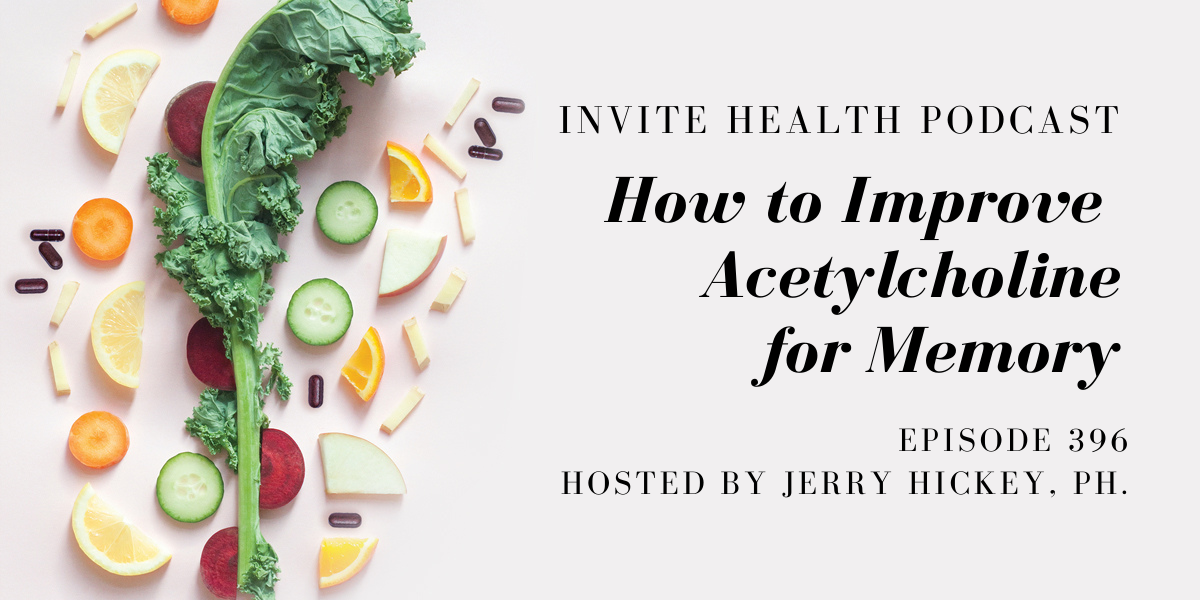How to Improve Acetylcholine for Memory – InVite Health Podcast, Episode 396

acetylcholine
InViteⓇ Health Podcast, Episode hosted by Jerry Hickey, Ph.
Subscribe Today!
If you’re beginning to forget things more commonly than usual, having trouble learning something new or losing your train of thought during a conversation, it may be related to the age-associated drop in the important neurotransmitter acetylcholine.†
The role of acetylcholine in the brain
Acetylcholine is produced naturally in your brain. It also works in the rest of your body, where it is involved in muscle function, heart function and more. But we’re focusing on the brain because acetylcholine is core to forming memories and learning. This nutrient has a natural decline with age and it leads to that age-related forgetfulness. We call this subjective memory loss.†
Acetylcholine is needed for more than just remembering and learning. You also use it for problem solving. For instance, if you get off the highway at the wrong exit and need to figure out how to get back on the right track, acetylcholine is needed for that. It’s also important for logical reasoning, as well as for focus and concentration.†
Restoring this important nutrient
So how do you restore acetylcholine in the brain and body? It’s made out of choline, which is a water-soluble B vitamin. Regular choline is hard to get into the brain and it’s not in the best foods. It is in egg yolks and you do get some in fish, but a lot of the sources of choline are things such as organ meats. The choline used in most multivitamins and B-complex formulations doesn’t get into the brain very effectively. That doesn’t mean it’s not good.†
Choline is needed for nerve health, muscle health and liver health, but the form of choline that really gets into the brain is phosphatidylcholine, which is the precursor to making acetylcholine. You can get some phosphatidylcholine in legumes, but you get a lot in krill oil. Krill is a tiny crustacean related to shrimp. When we get krill for our Krill Oil Advanced formulation, we get it from a very clean, sustainable fishery in Antarctica. When you take krill oil or get phosphatidylcholine from legumes, the phosphatidylcholine readily enters your brain. The phosphatides are very important because they help maintain the structure of the brain, as well as the proper release of neurotransmitters, but it’s the choline that’s really important for your memory.†
KRILL OIL AND FISH OIL FOR BRAIN HEALTH, PART 1 – INVITE HEALTH PODCAST, EPISODE 48. Listen Now>>
90% of Americans do not get sufficient choline in the diet, which is why a krill oil supplement can be so helpful. When you take krill, you get phosphatidylcholine that readily enters the brain. You also get the fish oils that are attached to the phosphatidylcholine. Then, if you also take Alcar with ALA, the acetyl group from that supplement will attach to the phosphatidylcholine from the krill and that helps you reestablish your acetylcholine.†
In this episode, Jerry Hickey, Ph. explains the important role that the nutrient acetylcholine plays in memory. He also offers recommendations for how to rebuild levels in the body in order to support the brain.†
Key Topics:
- What is subjective memory loss?
- Additional functions of acetylcholine
- What are nerve growth factor and brain-derived neurotrophic factor?
- The impact of sleep on memory health
Thank you for tuning in to the InViteⓇ Health Podcast. You can find all of our episodes for free wherever you listen to podcasts or by visiting www.invitehealth.com/podcast. Make sure you subscribe and leave us a review! Follow us on Facebook, Twitter and Instagram at InViteⓇ Health today. We’ll see you next time on another episode of the InViteⓇ Health Podcast.


